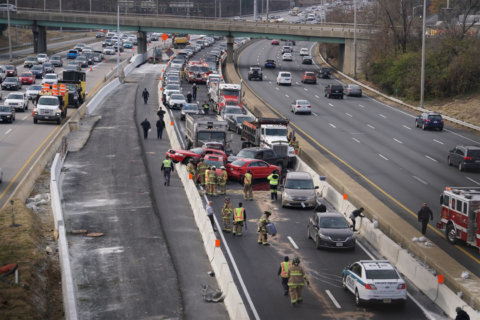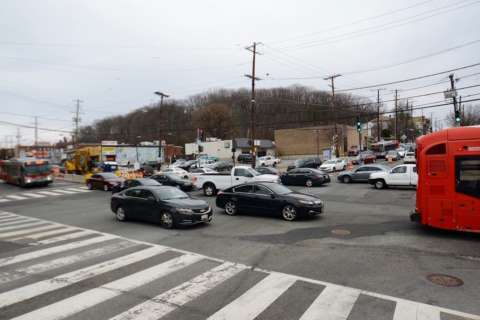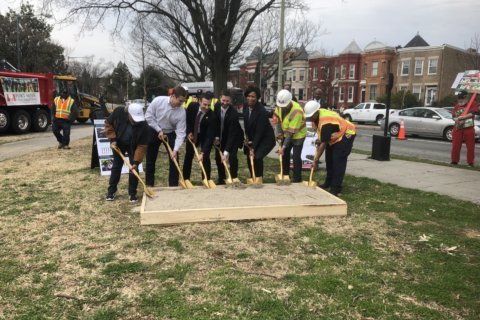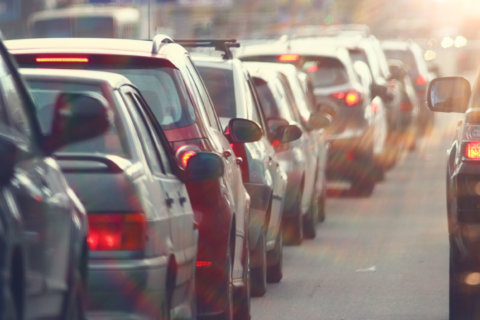The latest round of deaths on D.C. roads is prompting a renewed push for safety changes from the D.C. Council.
Abdul Seck was killed Easter Sunday at 16th and V streets in Southeast when a speeding driver slammed into another car, which in turn hit Seck on the sidewalk. Bike-safety advocate David Salovesh was killed Friday by a man attempting to speed away from police in a stolen van on Florida Avenue in Northeast. And Saturday, a speeding car hit a tree on East Capitol Street near the Benning Stoddert Recreation Center. The driver was killed.
Tuesday morning, D.C. Council members introduced a series of bills and announced plans for others that aim to finally make the city’s streets safer.
“I believe it’s past time to treat this with the urgency needed and to rethink our roadways to be safe for everyone who uses them, whether that’s on foot, on bike, on bus or in car,” Ward 6 council member Charles Allen said.
He plans a broad bill in coming weeks that would legally require the city focus on making streets safe for everyone each time a project is designed. The bill could be named in honor of Salovesh.
Protected bike lanes everywhere?
Ward 3 council member Mary Cheh introduced a bill Tuesday she had initially planned to name for Salovesh that would require the District Department of Transportation to install protected bike lanes on all roads that get major overhauls, in order to make biking in the city safer and easier.
Protected bike lanes are separated from car traffic, rather than simply being painted on the road.
Supporting the requirements, council member David Grosso said in a statement that too much focus is on accommodating the needs of drivers, which “creates a disastrous cycle for safety.”
As the chair of the council’s Committee on Transportation and the Environment, Cheh plans a series of pedestrian and cyclist working group meetings this summer focused on broad changes that may be needed.
Florida Avenue design delays
Allen introduced a separate set of three bills Tuesday that would restrict DDOT’s ability to shift capital funding to other agencies until designs are finally complete to make Florida Avenue in Northeast safer.
“DDOT began the discussions … in 2009. That’s 10 years ago,” Allen said.
There have been numerous crashes in the area between H Street/Benning Road and the area around New York Avenue since then, including the 2013 crash that killed Ruby Whitfield in a crosswalk near her church.
“Many drivers treat this neighborhood street as a commuter highway with high speeds and aggressive driving, a constant threat to the neighbors,” Allen said.
“Residents living along Florida Avenue have warned for years that if the city doesn’t take action, people are going to get killed,” he added.
Current DDOT plans call for designs of a safer street to be completed by the end of 2020, with construction beginning sometime in 2021 or later.
“I don’t know if a redesigned Florida Avenue would have saved either Ruby or Dave, but there will continue to be deaths on Florida Avenue and on other streets across this District until we demonstrate through our actions that we are prioritizing safety,” Allen said.
Florida Avenue is just one of many projects that could make streets safer or more efficient across the District that have either progressed agonizingly slowly or that have ended up essentially shelved — from bike and bus lane plans to changes to street and intersection designs.
Supporters of safety improvements plan a safe streets rally in memory of Seck at 16th and V streets in Southeast Wednesday evening, and a “Rally for Streets that Don’t Kill People” at noon Friday at the Wilson Building. They cite not only the deaths on the region’s roads, but also the many serious injuries in car crashes.
Md., Va. traffic prompts toll opposition
Council member Brianne Nadeau expressed concerns that the District will not be able to make all of the needed changes on its own, since the number of drivers on the city’s roads is also closely tied to highway projects in Maryland and Virginia.
Nadeau, with the support of Allen, Cheh, Grosso and Elissa Silverman, introduced a resolution opposing Maryland Gov. Larry Hogan’s plans for toll lanes on the Capital Beltway and Interstate 270, calling for public transit to be added instead.
The Hogan administration says toll lanes would speed up traffic flow without direct costs to the state, since a private company would build and operate the lanes in exchange for the cash paid by drivers who use the lanes.
“Widening these highways would have a direct negative consequence on the District of Columbia. Therefore, I believe it is our duty to weigh in,” Nadeau said.
She cited studies that have found adding regular lanes to highways to reduce delays in the near term encourages more drivers to use the roads over the long term, adding to pollution and other problems.
“This induced demand of increased car commuting will mean that the safety of D.C.’s residents will be put at risk as a result of traffic fatalities and cases of asthma in our most vulnerable communities,” Nadeau said.
If more drivers come into the District, it could also drive up road maintenance costs, she added.
“This resolution urges the Maryland governor to reconsider plans to expand highways in the D.C. region in favor of solutions like rail and bus, the only solutions proven to work,” Nadeau said.
The council or committees will consider each of the measures in coming months.









